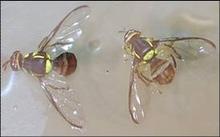Category:
Pilot project
Acronym:
Barfly
Coordinator:
Massimiliano Virgilio (RMCA/RBINS)
JEMU partner:
Jeroen Van Houdt, Floris C. Breman
Project summary:
The use of natural history specimens to produce DNA barcodes is hampered by a number of conditions not directly related to the taxon itself. One of them is the age of the specimens. Currently a project is ongoing to develop DNA barcodes for fruit flies (Diptera, Tephritidae) using dry pinned specimens from natural history collections to a large extent. Results so far show that, when standard protocols are being applied, there is a strong decline in positive results with increasing age, rendering material older than 10 years only efficient for 12%.
Two methodologies may increase the yield to a certain extent: restoration kits, restoring small defects in the DNA chain; and development of internal primers producing shorter sequences which can then be combined.
The aim of this pilot project is to try optimizing the yield of DNA barcodes obtained by standard protocols, by applying the above methodologies to those extractions that provided negative results. This will lead to an improved protocol that could increase the use of traditionally preserved specimens in natural history collections for DNA barcoding.
Lab work progress:
Completed
Data analysis:
Completed
Starting date:
2008
Project status:
Completed

Output:
Peer-reviewed paper
Van Houdt, J.K.J., Breman, F.C., Virgilio, M. & De Meyer, M. 2010. Recovering full DNA barcodes from natural history collections of Tephritid fruitflies (Tephritidae, Diptera) using mini barcodes. – Molecular Ecology Resources 10: 459-465.
[IF: 1.631]